Who doesn’t require a database? Well, the value of data is quite exorbitant these days and due to its reusable nature, it will be seen growing over time. Did you know what happens after collecting this data? It is used to make quick predictions, and precise decisions – all you must be knowing is how to manage data seamlessly. The following post emphasizes some of the finest database software systems to take into account. These systems won’t just ease your jobs but also assist in the custom software development process and enhance your Return on Investment.
What is Database Software?
Databases are used for a plethora of purposes. At times you may find specific kinds of files whereas otherwise things can be integrated easily. Different types of data are being stored here to enhance business decision-making, quick- predictions, customer-facing apps, or even just for the sake of the record (some kind of history).
Now, who uses this database softwares? Of course, there are skilled professionals often known as database managers who exactly know how to deal with this tidal wave of data. No matter how intimidating or complicated this seems at the surface, by using the big data technology in the right way, user demographics, sales effectiveness and forecasting can be taken care of seamlessly. You see having a robust database system is just not enough, you need ample data to gain adequate insights. Fortunately, with tons of such issues, there are tons of solutions available so that managers can gain control over the entire cycle.
Apart from data managers, we have data scientists who tend to make the most of this database software. As a data scientist, one is often asked to sort through a massive amount of data. By doing this, they can create actionable business insights. And you know what, this must happen daily. With the help of database software systems, store data, access it, develop different models based on given data sets and automate time-consuming processes.
Types of Database Software
- Analytical Database Software
- Data Warehouse Software
- Relational database
- Distributed Database Software
- End-User Database Software
- NoSQL databases
- Non-native database management systems
Best Database Management Software
Having a database management software or system by your side means one can collect data and analyze it to a great extent. Here further below I would like to mention some of the best database management softwares that must be taken into consideration right away whether you want to retrieve data or manage it or even upgrade it without any hurdle!
#1 Solarwinds
One of the best names among database management software is SolarWinds. Now, what makes this one a cut above, you may ask? Well, it works wonders in regards to SQL query performance monitoring, analyzing and tuning.
Some of the most astounding features of SolarWinds include expert tuning advisors, machine learning, cross-platform database support, Cloud Database Support, Automation Management API, and so forth.
#2 Improvado
Are you in search of a database management system that excels in regards to integration with third-party tools, reporting, and appropriate data visualization? Well, improvado is the right choice to take into consideration. Improvado offers this all at quite a reasonable price. Now is this all? Not really! The database management software can offer quick migration and duplication of the database instantly, metrics can be compared simultaneously, real-time integration of data models, best customer support, error-free analysis and reports, etc. So you ask me why use Improvado, I say what’s wrong with considering this flexible and scalable marketing solution?
#3 Microsoft SQL Server
Another interesting and most sought-after database software solution to take into consideration is Microsoft SQL Server. If you are looking for software that turns raw data into actionable insights or software that assists programmers to leverage adaptive query processing or a system that corrects SQL plan performance, the Microsoft SQL Server is a perfect choice.
Some of the crucial benefits offered by Microsoft SQL server include:
- The new database is easy to set up
- Creating tables and designs
- Developing advanced queries is possible
- Advanced querying and easy management
- Check out its template explorer
#4 MySQL
Now this one is an open-source relational database system. It may quite interest you to know that most of the web hosting providers offer MySQL in their basic packages. And maybe this is the reason for its immense popularity.
Now, do you think this is just the only reason around? Nope! MySQL has the potential to increase scalability. Apart from this, businesses especially eCommerce businesses have the chance to leverage sophisticated applications. MySQL offers robust technical support and safeguards from malicious cyberattacks. Speaking of which, in case any data is lost this offers speedy data recovery, well-integrated with Apache web engine. You see, I can simply go on and on with MySQL.
#5 Amazon Relational Database Service (RDS)
Another name to take into consideration when looking for the best Database as a service is Amazon RDS. I am sure you must be well-acquainted with AWS, well this one is no less. A system that offers a secured connection and backs up data seamlessly, a system that is best in regards to flexibility, capability to read-heavy database workloads, etc. More or less, if you are familiar with MySQL, Oracle, or Microsoft SQL Server database engine, the Amazon Relational Database service won’t be that overwhelming.
Conclusion
Having a database software solution is no longer an exception. The above mentioned are some of the top and popular database softwares that offers robust and scalable performance, extensive customer support, magnificent data import and export capabilities and whatnot! So choosing anyone from the afore-mentioned list could be a winning move. I hope the objective of the article is fulfilled. In case, if you have any further doubts or queries, feel free to mention that in the comment section below.



